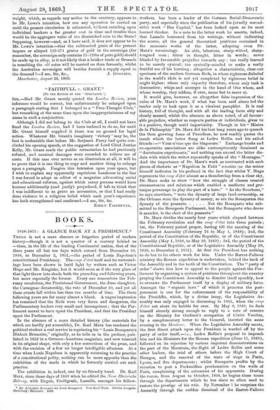" FAITHFULL v. GRANT."
[To TRE EDITOR OF THE " EFFCTATOE.-]
Stn,—Had Mr. Grant merely quoted the London Review, your inference would be correct, but unfortunately he enlarged upon a paragraph stating that I belonged to a "Free-Thought Club," but remarking at the same time upon the inappropriateness of my name in such a conjunction.
Although I did not belong to the Club at all, I could not have fined the London Review, had I been inclined to do so, for until Mr. Grant himself supplied it there was no ground for legal action. Whatever Mr. Grant's imaginary ' victory ' may be, the fact is undeniable that before Mr. Serjeant Parry had quite con- cluded his opening speech, at the suggestion of Lord Chief Justice Kelly, Mr. Grant made the public retractation he had previously refused, and nominal damages were recorded to relieve me of costs. If this case ever serves as an illustration at all, it will be to prove that it is one thing to copy and another thing to enlarge upon a paragraph. Forgive this intrusion upon your space, but I wish to explain any apparently capricious harshness in the line I was forced to adopt as editor of a magazine advocating social and educational reforms, against which many persons would have become additionally (and justly) prejudiced, if left to think that I was indifferent to so grave an accusation, or that I had really done violence to a religious belief which each year's experience has both strengthened and confirmed.—I am, Sir, &c.
EMILY FAITHFULL.






























 Previous page
Previous page